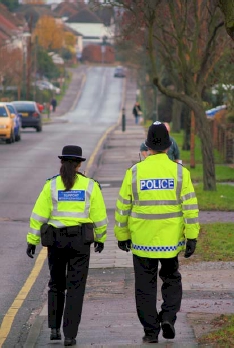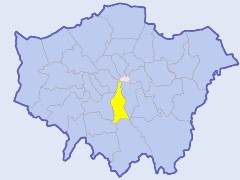Contents
This section contains the Lambeth Local Policing summary for 2007-08.
Warning: This is archived material and may be out of date. The Metropolitan Police Authority has been replaced by the Mayor's Office for Policing and Crime (MOPC).
See the MOPC website for further information.
Local Policing Summary: Lambeth 2007-08
People across London want more information about policing in their local area.
In particular you want to know how policing is delivered locally, how the police are performing and what the priorities for the police are, together with information about your local officers and how to contact them.
This local policing summary aims to do just that. By providing detailed information for each borough, the Metropolitan Police Authority (MPA) aims to keep you more informed about trends and developments in your area, and reassure you that we, and your local police, listen to what you tell us about the problems in your community.
Working in partnership to reduce crime
This annual local policing summary is produced by the MPA. Made up of 23 members who scrutinise and support the work of the Metropolitan Police Service (MPS), our role is to ensure that the views of Londoners are taken into account when deciding policing priorities and that London has the best possible police service to protect our communities.
Although the Authority does not have any responsibility for operational policing, it is responsible for monitoring how well those services are delivered.
It is the Authority’s job to ensure the Metropolitan Police perform to the best of their ability and are accountable to the people of London. The MPA also works to make sure local communities have a say in how they are policed.
Crime is at a ten year low in London
Primarily, the MPA exists to
- hold the Commissioner rigorously to account for improving the operational performance of the MPS
- transform community engagement to help Londoners secure more responsive policing
- work with the MPS to achieve cultural change throughout the service so that everyone in London can gain and retain confidence in policing
- drive the MPS to make the most effective, efficient and cost conscious use of all its resources
Metropolitan Police Authority
The MPA sets and monitors the police budget, which includes agreeing the level of council tax that you pay towards policing, and appoints senior officers to the MPS.
The MPA also sets annual priorities and targets for the police and we hold them to account for their performance against these.
The Authority has achieved real benefits for the people of London. We now have record numbers of police officers – over 31,000 - working to keep the capital safe, and London was first to introduce Police Community Support Officers (PCSOs), with over 4,000 now providing extra public reassurance and tackling anti-social behaviour in every ward across London.
Please contact the MPA if you would like more information about the ways in which the MPA works or would like to make any comments.
Looking back on 2007/08
Summary performance achievements
The MPS has achieved a number of successes against the objectives and targets set for 2007/08. The majority of the priorities and targets set by the MPA were met, particularly in terms of sanction detections, criminal justice and terrorism.
Some of the performance achievements between April 2007 and March 2008 are:
- the overall sanction detection [1] rate reached 25.1% against a 24% target. The MPS continues to show increases year on year;
- the MPS exceeded its target for offences brought to justice (OBTJ) obtaining 209,107 against a target of 197,200;
- the MPS achieved a reduction of 8.8% for recorded crimes that compare to those surveyed by the British Crime Survey (BCS). This exceeded the reduction target of 5.5%.
However, some targets were not met, most notably:
- gun enabled crime decreased by 1.4% against a 5% reduction target;
- public satisfaction across the MPS was 77% against a 82.5% target;
- the gap between the satisfaction of White victims (78.8%) and Black and Minority Ethnic victims (71.8%) was 7 percentage points. This missed the target of a 5.3 percentage point gap.
Setting policing priorities for London
Policing London Business Plan 2008/11
 The three year business plan sets out how the MPS
will deliver against the policing priorities of government, the Mayor of London and the people who live and work in London. Targets are set and monitored throughout the year to ensure the MPS
continues to reduce crime and increase public safety.
The three year business plan sets out how the MPS
will deliver against the policing priorities of government, the Mayor of London and the people who live and work in London. Targets are set and monitored throughout the year to ensure the MPS
continues to reduce crime and increase public safety.
The strategic priorities in the plan are to:
- Make our services more accessible and improve people’s experience of their contact with us.
- Make our neighbourhoods safer through local and citywide problem solving and partnership working to reduce crime, anti-social behaviour and road casualties.
- Enhance our counter terrorism capacity and capability.
- Plan for, and effectively police, major events in London and prepare for the 2012 Olympic and Paralympic Games.
- Reduce serious violence and protect young people.
- Disrupt criminal networks and reduce the harm caused by drugs.
Have your say on policing in London
Public consultation plays an important part in setting the policing priorities for London.
The MPA is considering the priorities for 2010/11 and would like to know what you think the police in London should be focusing on.
Have your say on policing in London by taking part in this year’s consultation questionnaire.
Lambeth: local information
Message from Commander Sharon Rowe

“Lambeth achieved its sixth successive year of crime reduction in 2007/08. Overall crime was reduced by 7.8%, which meant 3013 fewer victims. We want Lambeth residents and visitors to be safer and to feel safer. To achieve this we’ve drawn up five borough priorities, and we’ll be working very closely in partnership with the local authority and other agencies to deliver on them.
“Our priorities are to reduce serious violent crime; reduce the harm associated with drug and alcohol misuse; support young people by tackling gangs and reducing youth offending; support more resilient, cohesive communities by closer engagement with communities; and support safer and more respectful neighbourhoods.
“Serious violent crime is the number one concern of Lambeth residents so this must be at the top of our agenda. However, all five priorities are vital to tackle the root causes of offending and make our neighbourhoods safer.”
How did Lambeth perform during 2007/08?
| Offence | Up or down? | Number of offences | Percentage | Target |
|---|---|---|---|---|
| Robbery of personal property | 468 | -17.5% | Target Achieved | |
| Residential burglary | 63 | +2.3% | Target Missed | |
| Theft from vehicles | 282 | -9.7% | Target Achieved | |
| Theft or taking of vehicles | 86 | -6.7% | Target Achieved | |
| Theft of pedal cycles | 245 | -24.0% | Target Achieved | |
| BCS criminal damage | 446 | -10.1% | Target Achieved | |
| BCS total | 2362 | -10.2% | Target Achieved | |
| Gun enabled crime | 17 | -6.8% | Target Achieved |
Looking forward
Borough priorities are set through consultation with the public (Safer Neighbourhoods events, ‘Have your say’ public survey), the police, and other agencies involved in crime reduction in your area.
Priorities for 2008/09
- 5.2% reduction in youth violence and similar reductions in gun crime and knife crime
- 3.2% reduction in serious acquisitive crime, 6% reduction in residential burglary
- 3.3% reduction in robbery, 1% in theft of MV and 1% in theft from MV
- challenging targets for sanction detection rates across specific crime types
Lambeth: local police initiatives

Abandoned bicycles were given a new lease of life thanks to a partnership between Brixton police and a local youth project.
Brixton Bicycle Art benefited from a donation of 9 unclaimed bicycles from local police. In two workshops in June and August 2008 young people were shown how to create original designs to decorate the unclaimed bicycles and were taught repair and riding skills.
Sergeant Tom Cornish of the Herne Hill Safer Neighbourhoods team said:
“My team polices the Brockwell Park area and we value Brixton Bicycle Art’s work with local youngsters. They provide constructive activities, which keep young people out of trouble and teach them useful skills. I hope that we can develop this partnership and donate more bicycles in future”.
Partnership working: getting involved
Help us to understand the community’s views on policing in your area
The MPA has a statutory duty to consult and engage with the communities of London and to give a voice to local people on policing, priorities, concerns and the future direction of the MPS. Therefore the MPA has established Community Police Engagement Groups (CPEGs) in each of the 32 London boroughs (in some London boroughs these groups are known as Community Safety Boards (CSBs) or Community Police Consultative Groups (CPCGs)). The primary aims of the CPEGs are to consult with their local police, Safer Neighbourhoods Panels, the MPA and key stakeholders in Crime and Disorder Reduction Partnerships about strategic policing, including consultation on the annual policing plan development, implementation of Neighbourhood Policing, and crime and disorder reduction.
CPEGs are intended to be representative of the local population, and more particularly those groups that interact with the police in disproportionate numbers. Their activities are not limited to committee work but include active community engagement in neighbourhoods and with local groups.
Independent Custody Visitors
Independent Custody Visitors (ICVs) are ordinary members of the local community appointed to make sure that the welfare of people detained in police stations is maintained. They call at police stations unannounced, speak to detainees and write short reports about their visit. Their recommendations can require the police to make improvements in this area.
ICVs play a valuable role in maintaining public confidence in this important aspect of policing. They work with others as part of a local panel and help the MPA, which oversees custody visiting in London, to make sure that detainees are treated appropriately and that their rights are respected.
ICVs must be aged 18 or over. If you would like to find out more about how you can get involved, please visit MPA ICV recruitment or call freephone 0808 100 1036.
The MPA Stop and Search Community Monitoring Network (CMN)
Stop and Search measures are useful in the fight against crime, but they are also controversial powers for many people. The MPA supports Stop and Search Monitoring groups in all 32 boroughs and facilitates a London wide CMN as a means of building and sustaining trust and confidence in the appropriate exercise of Stop and Search powers.
The work of these groups is crucial and they rely on the input and involvement of volunteers. If you would like to get involved in a local or pan-London group to monitor and influence the way Stop and Search is used in London, please call 020 7202 0233 or email stopandsearch@mpa.gov.uk for more information.
Footnotes
1. Sanction detection is where an offender has been identified and a legal action/‘sanction’ has been taken. [Back]
Alternate formats
This is also available as a PDF document [PDF]
Send an e-mail linking to this page
Feedback